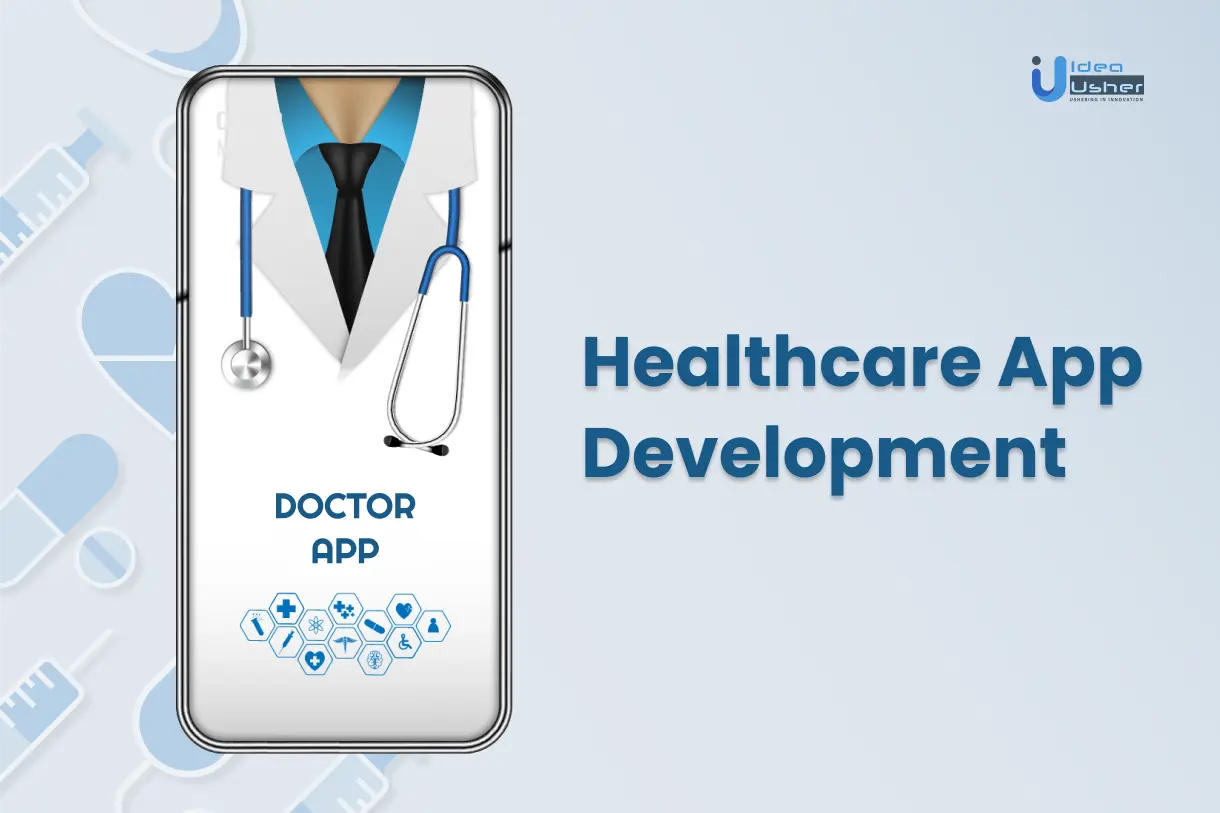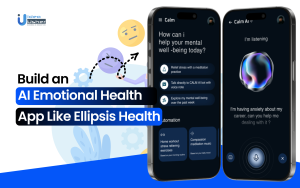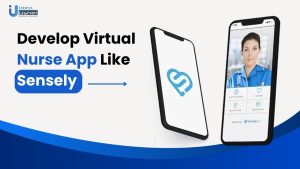According to CB Insights, everything in the healthcare app development sector, including health education services, patient monitoring, and medical consultations, has seen a roughly 300 percent increase in investment.
By 2025, the market for mobile healthcare applications is expected to grow by $300 billion.
Here in this blog, we’ll learn and explore the healthcare app development process, types, and benefits.
Healthcare App Development: Overview
The critical aspect of healthcare apps is to create an app that helps patients, doctors, and the healthcare industry in real-time.
Medical health is a vast sector and includes various professional applications. These apps generally simplify our life by tracking our health data, ensuring assistance through consultancy, sharing methods to improve our health, etc.
Types of Healthcare App
Medicine Delivery App
One of the most popular apps present in the healthcare sector is the medicine delivery app. Patients can order the medicine as they were prescribed at their doorstep. Additionally, this app consists of many verticals, which include different categories of medications.
The market for drug delivery can reach $2,206.5 billion by 2026.
Features
- Show your barcode after prepaying for your medicines to receive a more private pickup.
- View your medication history, order refills, and check on their status.
Online Doctor Consultation App
This app helps doctors and patients to connect virtually. It offers several features such as appointment booking, selling medications, etc.
This type of app has made the consultation process easy and comfortable.
Features
- Allow video conferencing
- Store data and medical records
Diet and Nutrition Apps
Another type that can transform the healthcare sector is diet and nutrition apps. It assists users in tracking their daily nutrient intakes which will help them to maintain their healthy lifestyle.
Features
- Provides an automatic macro calculator that shows your carbs, fat, and protein levels.
- Examine your diet consumption and compare various foods’ caloric and macronutrient contents.
Fitness App
The fitness app works like a tracker which examines the user’s daily physical activity. Moreover, the app provides statistics for active calories, stand minutes/hours, walking distance, stairs climbed, workout minutes, and many more metrics.
Features
- Provides an AI personal trainer.
- Provide daily training plans and schedules with the help of AI-Coach.
Health Monitoring App
This app helps individuals monitor health conditions such as blood pressure, sugar level, heart rate, etc.
Also, it helps users to get previous and current data, which allows them to improve their medical conditions.
Features
- Monitor Hypertension with accurate blood pressure results.
- Track daily activity and workout sessions.
Pregnancy App
A pregnancy app helps women track the health and well-being of a baby inside a womb. This app also assists users in recording everything related to appointments, fetal growth, etc.
Features
- Provides fetal growth
- Offers pregnancy exercises and nutrition advice.
What are the Steps for Building a Healthcare App?
Here’s a list of steps mentioned below:
Step 1: Market Study
The healthcare app development involves market analysis. Before going any further, one should complete the study about the sector and competitors. How are they making developments in the healthcare sector? What are their strengths? What are their weaknesses? How can you be better than them?
Step 2: Choose App Type
The healthcare app consists of several things, such as the app’s features, database, and objective. An individual can’t demand developers to build a healthcare app; you’re required to elaborate the structure and things you’ll need for your healthcare app, something like:
- What type do you need for your healthcare app?
- Define the work process.
- What solutions will it provide?
Step 3: Design
After choosing the type and features required for your healthcare app, it’s time to move on with the design phase.
The success of an app is determined by its design, and healthcare apps should have a consistent, user-friendly interface. Its objective is to efficiently guide the user to the endpoint.
The design must be user-friendly, and the cognitive load of the app should also be minimized to the greatest extent.
The application’s objective must be clear. Every operation and function must be straightforward to use because users prefer apps that are simple to use.
Step 4: HIPAA Compliance
Building some rules is essential if one plans to develop a healthcare app. The HIPAA (health insurance portability and accountability act) ensures the protection of personal information for patients and healthcare providers. Want to make sure if the app follows HIPAA requirements?
Let’s focus on the short checklist given below:
- Limit user health data access
- Ensure data backup
- Make use of HIPAA services
Step 5: Development
To start with, proficient professionals should be employed (backend developers, front-end developers, project managers, product managers, etc.) Also, there’s a need to purchase the appropriate equipment and technology. Many businesses choose to collaborate with an offshore development team at this point.
The best strategy is to first create an MVP, which will provide a quicker launch while saving development time. Receiving consumer input, comprehending marketing positioning, and forming connections will be much simpler.
The healthcare app development process includes three main aspects, API, front-end, and backend.
- A database and a server-side object supporting the functions of the healthcare app are included in the backend process.
- An intermediary between the app and the backend: Application Programming Interface (API).
- Everything a user sees and uses in the app is the front-end. Also, the front-end is where a user will engage with your program.
Step 6: Quality Assurance (QA)
If done early in the app development process, application testing is a prerequisite that could assist someone in saving money.
No matter how much testing and debugging developers do when creating a healthcare app, they still rely on quality assurance testing to find blind spots. This will ensure that the app is operating at its full potential.
This phase is essential since every issue must be fixed before the software is available. Pre-release suggestions for the app include the following:
- Stay user-focused and intuitive.
- Analyze the needs and pain points of users.
- Respect established safety and privacy requirements.
Step 7: Launch
Now it’s time to upload the app to Google Play, the App Store, or the platform you like. As soon as you release the product, you begin considering potential upgrades.
After the launch of the app, if you want to allow customers to express their dissatisfaction with the app without submitting a negative rating, then you should implement a customer feedback system.
Step 8: Maintenance
The work doesn’t end even after the launch process. The focus now shifts to performing a constant app up-gradation ensuring complete stability of the app. Also, continuous maintenance is required to keep the app bug-free and high-functional.
Below are the key focus points in the maintenance stage:
- Bug fixation and maintenance
- Introducing new and advanced features
- Latest version updates
- Code Optimization
Top 3 Best Healthcare Apps of 2022
The top health applications of 2022 are listed below:
1. HealthTap- Online Doctor Consultation App
If you frequently Google health symptoms and worries, you’ll love this app because it provides answers to countless inquiries from actual doctors on a broad range of issues.
With HealthTap, you may manage your medications and examine your lab results.
| App | HealthTap |
| Category | Medical |
| Downloads | 100k+ |
| Price | Free |
| Ratings | 4.7 |
| USP | Book live consultations with doctors, dentists, and psychologists. |
2. Talkspace- Online Therapy App
It might be challenging for an individual to find time and meet with a mental health expert when you have a packed schedule.
Talkspace aims to eliminate this problem by making it simple for you to connect with qualified therapists. It is the best fit for you and your particular needs.
| App | Talkspace |
| Category | Health & Fitness |
| Downloads | 500K+ |
| Price | Free |
| Ratings | 4.7 |
| USP | Provides on-demand qualified therapists. |
3. Noom- Diet and Nutrition App
Noom has you covered whether you want to lose weight or eat a healthier diet. Also, you have to answer questions regarding your weight, health objectives, way of life, and coaching preferences.
| App | Noom |
| Category | Heath & Fitness |
| Downloads | 10M+ |
| Price | Free |
| Ratings | 4.1 |
| USP | A health coach will be assigned to you and work with you to achieve your aim related to your health conditions. |
Tech Stack Required for Healthcare App Development
The successful creation of healthcare applications is aided by using the appropriate technologies.
Let’s study the following table:
| Function | Technologies |
| Front-end Framework | ReactJS, NextJS |
| Back-end Framework | NestJS, Hasura, AWS Lambda |
| Payment gateway | Stripe |
| Database | Postgres |
| Cross-Platform | Google Cloud or AWS |
| Message & Notification | Firebase Cloud Messaging |
What are the Benefits of the Healthcare App?
Do you want to know why healthcare apps are so popular? These apps fulfill the demand and also provide a state of relaxation to doctors and patients.
Let’s check out a few advantages given below:
For Doctors:
- Doctors can keep an eye on their patient’s health even when they are far away.
- A clinic or doctor’s brand is more likely to get famous and well organized as the number of individuals adds reviews, bringing confidence and loyalty to patients.
- It encourages better treatment plans, and healthcare care delivery and improved outcomes can bring productivity and cause profit to doctors.
- The app helps to relieve doctors from monotonous work and improves the effectiveness of the healthcare system. In addition, it’s impressive how eliminating paperwork can boost the morale of medical workers.
For Patients
- Video calls can be scheduled via mHealth apps, allowing patients and doctors to communicate more comfortably. They create prescription lists without carrying out paperwork and easily manage medicine schedules through these apps.
- If one is using a healthcare app, there’s no need to worry about the payment as it can be done online. It is a fast and convenient method for patients.
- Patients can share their medical records with other institutions by exporting them.
- People don’t need to leave their homes to get solutions to most problems, thanks to healthcare apps. There is no need to waste time traveling to the hospital or waiting in line.
Final Words
Healthcare app development seems to provide a tonne of commercial potential. Several healthcare organizations or providers are also investing in this field to raise service standards, boost productivity, and encourage users’ self-management practices.
We at Idea Usher assist in implementing the healthcare app and work according to your market idea. We’ll put your idea into practice and build a mobile app with the help of our team of skilled healthcare developers.
We’ve covered a lot of ground in terms of creating medical apps. There is always more information that we only disclose to clients and business partners.
Numerous successfully released solutions for the medical sector testify to our extensive competence in developing customized healthcare apps. Contact us to begin creating your healthcare solutions!
Get in touch: https://ideausher.com/contact/
Email: [email protected]
Phone Numbers: (+91) 946 340 7140, (+91) 859 140 7140, and (+1) 732 962 4560
Build Better Solutions With Idea Usher
Professionals
Projects
FAQs
How long does it take to develop a healthcare app?
A healthcare app takes between 5 and 6 months to construct, depending on the design, design features, and the specialists involved.
What are the features essential for creating a healthcare app?
Building a health application may need several capabilities, even live video conferencing. However, a few of these app features, including dashboard functionality, chat and messaging, cloud connectivity, payment processing, etc., are essential when deciding how to build a health app.
What makes a good health app?
Identification of particular evaluation tool elements, questions, and items is necessary. For example, gaining technical information, practical aspects of app functionality, and analyzing evolving capabilities of mobile medical apps.
How does the healthcare app work?
Healthcare apps:
- Help people keep track of their health concerns, such as heart disease, diabetes, pregnancy, mental health, and more;
- Enable remote sharing and reporting of patient personal health records by healthcare professionals;
- Also, facilitate medication management.























